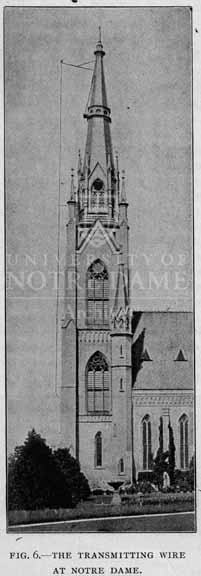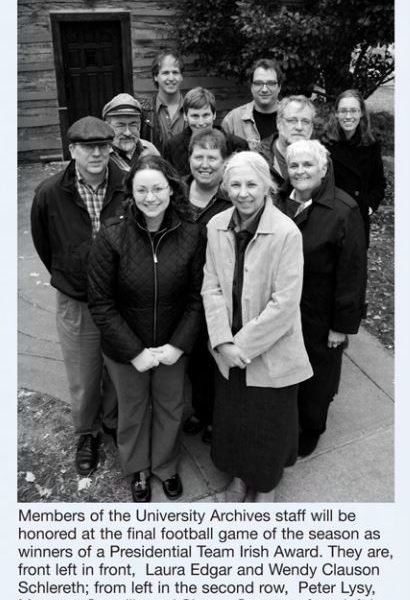
In April 1899, Professor Jerome Green and his assistants were experimenting with wireless telegraphy. Green is thought to be the first to send wireless transmissions in America and the first to use homemade apparatuses, as opposed to using foreign-made equipment. The experiments started by transmitting signals from the physics  laboratory in Science Hall (now called LaFortune Hall) to other rooms in the building. They succeeded in sending signals from Science Hall to Sorin Hall, then from the flag pole to the Novitiate (which was located near present-day Holy Cross House). “They found that everything worked perfectly well here, and so they set about their last and greatest trial. This was to send a message from Notre Dame to St. Mary’s Academy which is more than a mile away from the University [, using the Basilica of the Sacred Heart for the transmission wire]. … This is the farthest distance a message has been sent in this country as far as we know and the boys in the scientific department feel highly elated over their success.” [Scholastic, 04/22/1899, page 494].
laboratory in Science Hall (now called LaFortune Hall) to other rooms in the building. They succeeded in sending signals from Science Hall to Sorin Hall, then from the flag pole to the Novitiate (which was located near present-day Holy Cross House). “They found that everything worked perfectly well here, and so they set about their last and greatest trial. This was to send a message from Notre Dame to St. Mary’s Academy which is more than a mile away from the University [, using the Basilica of the Sacred Heart for the transmission wire]. … This is the farthest distance a message has been sent in this country as far as we know and the boys in the scientific department feel highly elated over their success.” [Scholastic, 04/22/1899, page 494].
News traveled quickly of Green’s success, which “led the Chicago Tribune to invite Professor Green to Chicago to test the conditions that obtain in a large city.” [Scholastic, 05/06/1899]. The obstacles were great, but after experimenting sending signals to and from various buildings, Green was finally successful in sending messages for half an hour between the Tribune and Marquette buildings. He was “able, after six hours of trial, to prove the Marconi system practical.” [Sunday Times Herald Chicago, 04/23/1899].
Sources: Scholastic Magazine, 1899
Jerome J. Green Clippings (CZDD and PNDP 01-Gr-3)


